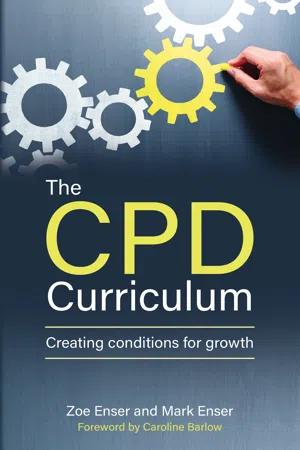
- 160 pages
- English
- ePUB (mobile friendly)
- Available on iOS & Android
About this book
Co-authored by Zoe Enser and Mark Enser, The CPD Curriculum: Creating conditions for growth shares expert and practical guidance for schools on designing and delivering continuing professional development (CPD) that truly lives up to its name.
There is a wealth of research available on professional learning, from both within and outside the education sphere, and in this book Zoe and Mark pull it all together to help school leaders optimise teachers' ongoing learning and growth.
Zoe and Mark explain how schools can overcome issues with CPD that can leave teachers plateauing in their development after just a few years, and share a variety of case studies that illustrate the key
components of an effective CPD programme that builds on teachers' prior knowledge.
The authors spell out the importance of CPD and explain how, when done well, it gives teachers the agency to make professional decisions informed by the best evidence and experience they have to hand. Furthermore, they explore how high-quality professional development contributes not only to a collaborative culture within the school staff team and enhanced job satisfaction for teachers, but also to improved student outcomes.
Split into three parts - intent, implementation and impact - the book covers a range of key areas, including: coaching and mentoring, subject-specific CPD, empowerment and self-efficacy, delivery methods and quality of materials. They also examine the current issues and common pitfalls surrounding CPD and offer guidance on how it can be improved, with clear end goals in mind.
Suitable for school leaders, heads of department and CPD leads in all settings.
Frequently asked questions
- Essential is ideal for learners and professionals who enjoy exploring a wide range of subjects. Access the Essential Library with 800,000+ trusted titles and best-sellers across business, personal growth, and the humanities. Includes unlimited reading time and Standard Read Aloud voice.
- Complete: Perfect for advanced learners and researchers needing full, unrestricted access. Unlock 1.4M+ books across hundreds of subjects, including academic and specialized titles. The Complete Plan also includes advanced features like Premium Read Aloud and Research Assistant.
Please note we cannot support devices running on iOS 13 and Android 7 or earlier. Learn more about using the app.
Information
Why CPD matters










Table of contents
- Praise
- Title Page
- Dedication
- Foreword
- Acknowledgements
- Contents
- Introduction
- Chapter 1: Why CPD matters
- Chapter 2: Intent
- Chapter 3: Whole-school implementation
- Chapter 4: Departmental and individual implementation
- Chapter 5: Impact
- Conclusion
- Bibliography
- About the authors
- Copyright
- Advertisement